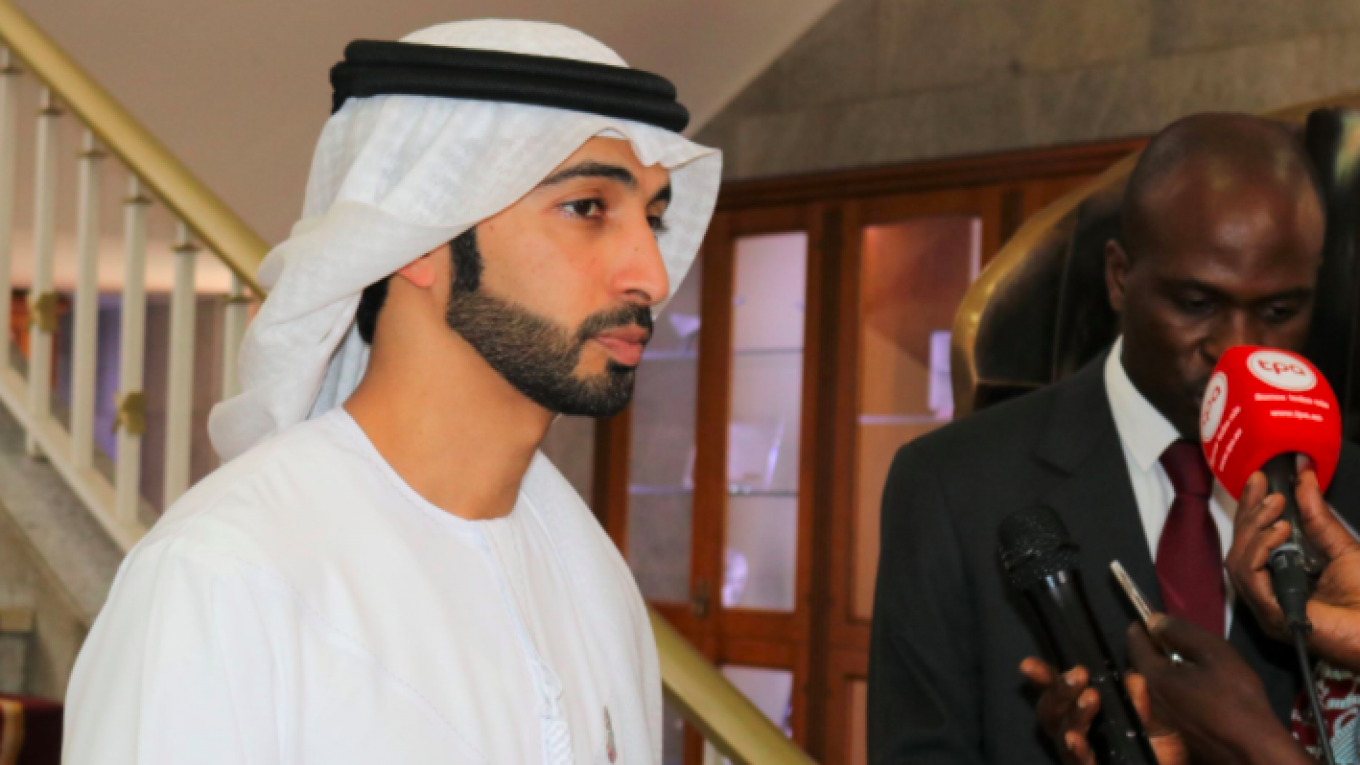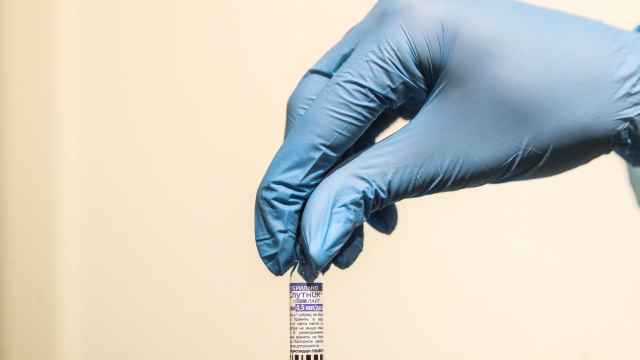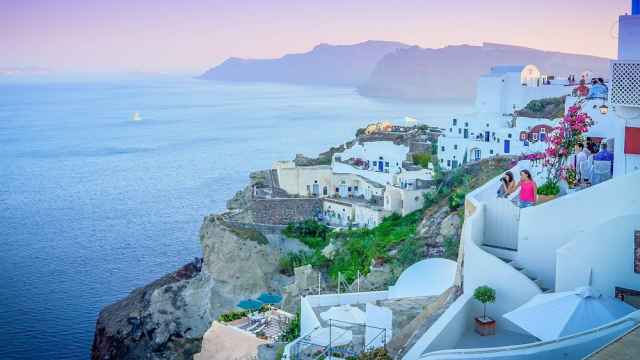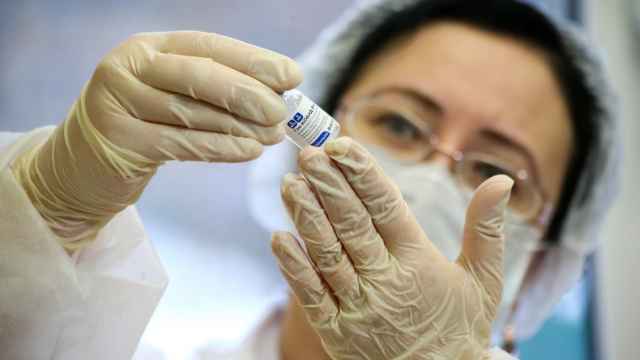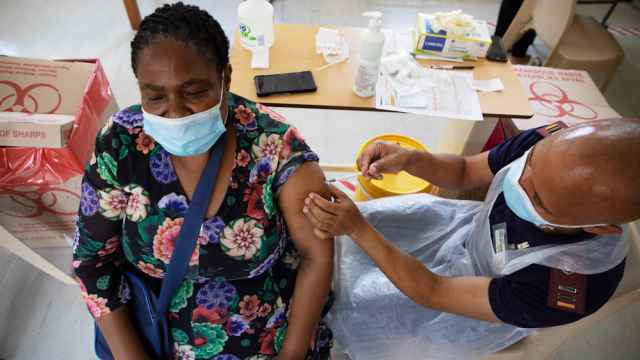A botched deal to supply 1 million Sputnik V doses to Kenya was part of the same controversial Emirati scheme which has seen an Abu Dhabi-based company with royal connections ink deals to resell Russia’s flagship coronavirus vaccine at huge mark-ups.
Documents obtained by The Moscow Times confirm that Russia named Aurugulf Health Investments — a firm registered in the United Arab Emirates (UAE) and linked to Emirati royalty — as an official Sputnik V reseller in Kenya, where it secured a contract with private healthcare company Dinlas Pharma to ship at least 1 million jabs to the African country.
The deal eventually collapsed after the government in Nairobi learned a first shipment of 75,000 doses, which arrived in Kenya on March 22, had not come direct from the Russian government, and subsequently blocked them from use across the country at a time when Covid-19 cases were surging.
The confirmation of Aurugulf’s involvement in Kenya follows The Moscow Times’ previous investigation which uncovered a complex scheme in which Russia awarded the firm — and minor Emirati royal Sheikh Ahmed Dalmook al-Maktoum — exclusive resale rights for Sputnik V in at least five countries across three continents. Documents showed how Maktoum and Aurugulf resold the Russian vaccines to governments and private sector buyers at up to twice Russia’s official price, with payments from the deals flowing directly to Maktoum’s private office.
The Kenya agreement is outlined in a letter from the Russian Direct Investment Fund (RDIF) — the Kremlin-run sovereign fund which is leading the development and export of Sputnik V — to Kenya’s Cabinet Secretary for Health, obtained by The Moscow Times.
In the correspondence dated March 24, RDIF states its fully-owned subsidiary Human Vaccine (HV) “has authorized Aurugulf Health Investment — Sole Proprietorship LLC (Aurugulf), Abu Dhabi, United Arab Emirates, as the seller and distributor on a non-exclusive basis of ‘Sputnik V’ adenovirus vector vaccine in Kenya.”
The letter goes on to state that three batches of Sputnik V — two containing Sputnik V’s first dose and the third consisting of the vaccine’s second dose — had already been delivered to Kenya on March 22 with RDIF’s knowledge and approval.
“Given that the delivery came from an authorized partner, HV has no objection against issuing an import license for the delivered batches of the vaccine,” it adds. The letter is signed by Alexander Chistyakov, general director of Human Vaccine. Chistyakov also signed a number of other Sputnik V supply contracts, including with Hungary, Slovakia and Argentina.
Kenya is the sixth country for which The Moscow Times has found evidence that Russia awarded Aurugulf or Maktoum Sputnik V resale rights. It is the third country where the deal has been brokered with private healthcare companies, bypassing governments’ vaccine rollouts.
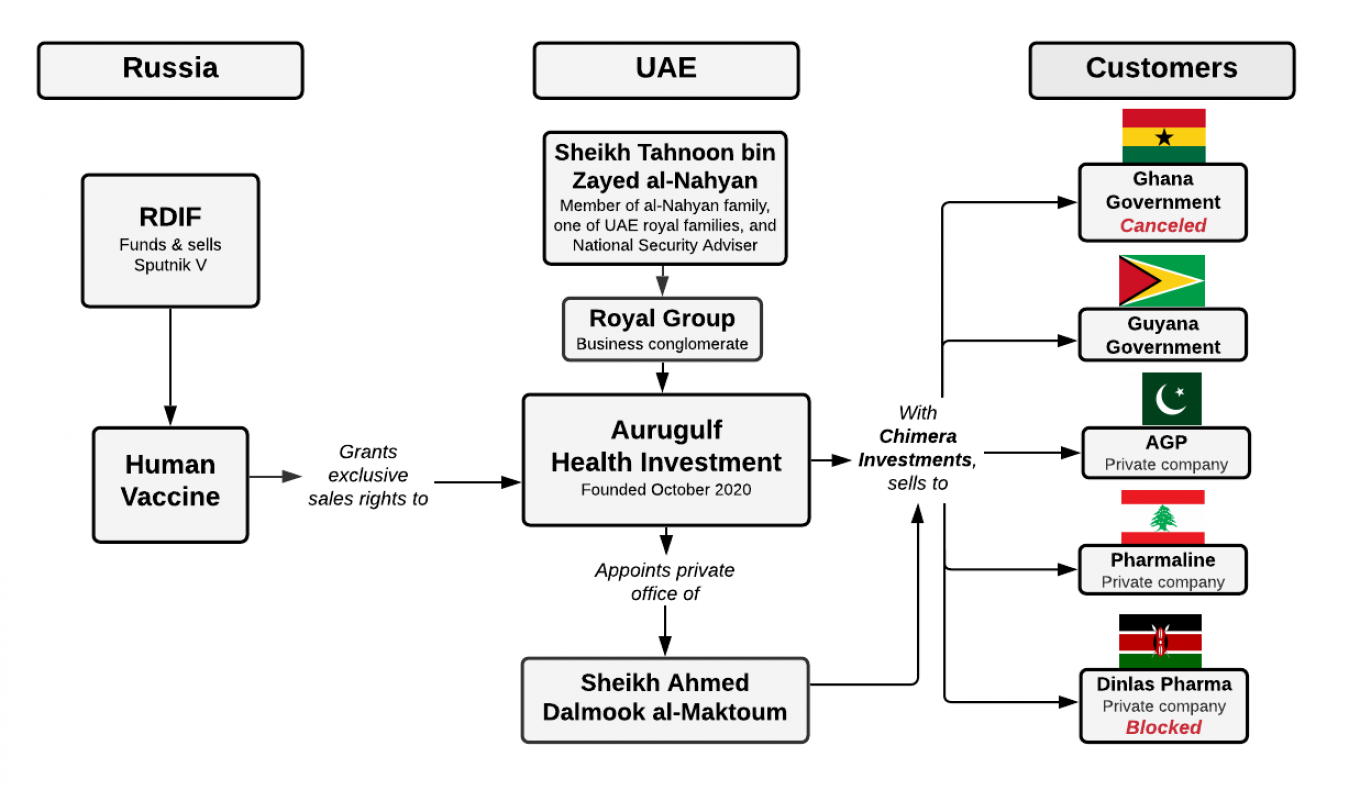
Kenya’s Dinlas Pharma also paid significantly more than Russia’s advertised price for Sputnik V to obtain the jabs via Aurugulf.
According to a pricing schedule obtained by The Moscow Times, Dinlas paid $18.50 a dose for the vaccines — almost twice Russia’s factory price of $9.95 — and planned to sell them to clients in Kenya for $42 each.
Russia has heavily promoted Sputnik V throughout the developing world as a cheap route out of the pandemic and the jab has received approval in more than 65 countries, mainly in Latin America, Africa and Asia.
Analysts describe Maktoum as a low-ranking royal. On letters sent to governments to secure Sputnik V resale contracts, he signs off with his name and “member of the ruling family of Dubai.”
But both Maktoum and Aurugulf have connections to the powerful Sheikh Tahnoon bin Zayed al-Nahyan, the UAE’s national security adviser and brother of the current leader of Abu Dhabi.
RDIF did not respond to a request to comment on the agreement. When reached by phone, the private office of Sheikh Ahmed Dalmook al-Maktoum refused to comment.
The deal would have seen Aurugulf make more than $8.5 million, minus transport and storage costs.
But the Kenyan government blocked use of the first batch of 75,000 jabs after it learned the vaccines had not been delivered directly by the Russian government and banned their use on April 2, having initially granted an emergency use authorization for Sputnik V on March 9.
The Sputnik V delivery deal was struck at a time of surging coronavirus cases in Kenya, with new infections doubling every 10 days throughout March, resulting in a tightening of lockdown restrictions and the introduction of internal travel bans. Nationwide vaccination has been slow, as Kenya is reliant on deliveries from the World Health Organization’s (WHO) Covax vaccine-sharing scheme. A first batch of around 1 million AstraZeneca vaccines arrived in early March, but as of July 19, the country of more than 52 million has administered 1.5 million vaccine doses, according to WHO data — enough to fully vaccinate just 1.4% of the population.
The current status of the imported Russian vaccines is unknown. One of the three batches expires at the end of July, and another at the end of August. Dinlas had paid almost $80,000 in import taxes, a customs receipt shows, and taken out an insurance policy against adverse effects of the vaccine with a $37,000 premium.
A diplomat at the Russian Embassy in Kenya previously told The Moscow Times he did not know where the vaccines had come from, but that Dinlas had tried to sell them on to other countries after they were banned.
Before being shipped to Kenya on March 22, the vaccines had been stored in the United Arab Emirates since at least Feb. 28, according to temperature logs — also obtained by The Moscow Times — for the Al Khair Coldstore, a facility located 30 minutes from Dubai Airport.
Sputnik V needs to be kept at temperatures below minus 18 degrees Celsius and thawed just before use.
Ghana revokes contract
The revelation that Kenya also used Aurugulf as a middleman to buy Sputnik V vaccines comes as Ghana announced it had cancelled its own $65 million contract with the provider after it failed to deliver batches of Sputnik V on time.
The Ghanian government is facing a political crisis at home as opposition politicians pile pressure on the Health Ministry over its decision to sign a deal with Maktoum and Aurugulf to supply Ghana with 3.4 million doses of Sputnik V at $19 each — almost twice Russia’s advertised selling price.
Under a contract between Ghana’s Health Ministry and the “Private Office of His Highness Sheikh Ahmed Dalmook al-Maktoum,” signed March 9 and seen by The Moscow Times, Maktoum agreed to deliver the full 3.4 million by the end of June in a total of five batches. But Ghana had received just 20,000 as of last week when it decided to pull the deal, the Health Ministry said last week.
Payments for the vaccines — totalling $64.6 million — were scheduled to be made to Maktoum’s private office.
The contract was signed by Aurugulf’s executive secretary Diana Borovytska, whose social media profiles indicate she is a Ukrainian national residing in Dubai who frequently participates in beauty pageants. Borovytska did not respond to a request for comment on the agreement.
Speaking to a parliamentary commission last week, Ghana’s Health Minister Kwaku Agyemang Manu announced the contract had been terminated after Maktoum had informed him he was “struggling to raise the vaccines.”
Manu also said Maktoum had initially demanded up to $38 a dose for Sputnik V — a 281% markup on Russia’s factory price — when negotiations between the two sides started.
“I wanted to find vaccines at any cost — and that is what pushed me to accept the $19 price,” Agyemang told the inquiry.
Vaccination rates in Russia have accelerated dramatically over the past month, triggering local supply shortages and numerous reports of Russia delaying international shipments — particularly of Sputnik V’s second dose, whose formulation differs from the first dose and is harder to manufacture, industry figures say.
Other countries involved in the Aurugulf resale scheme have also fallen behind in their delivery schedules. For instance, the company asked its private sector customers in Lebanon whether they would accept a heavily delayed shipment containing only first doses of Sputnik V. The request was denied as Lebanon’s authorization for Sputnik V specifically states the vaccine is a two-dose regimen and shots must be administered 21 days apart.
RDIF recently said the time between the first and second doses could be extended to 180 days instead of the 21-day period it initially recommended. That shift in guidance comes despite studies showing that two doses of other coronavirus vaccines offer a much higher level of protection and have a bigger impact on reducing the transmission of new more aggressive virus variants, such as Delta, than a single shot.
A Message from The Moscow Times:
Dear readers,
We are facing unprecedented challenges. Russia's Prosecutor General's Office has designated The Moscow Times as an "undesirable" organization, criminalizing our work and putting our staff at risk of prosecution. This follows our earlier unjust labeling as a "foreign agent."
These actions are direct attempts to silence independent journalism in Russia. The authorities claim our work "discredits the decisions of the Russian leadership." We see things differently: we strive to provide accurate, unbiased reporting on Russia.
We, the journalists of The Moscow Times, refuse to be silenced. But to continue our work, we need your help.
Your support, no matter how small, makes a world of difference. If you can, please support us monthly starting from just $2. It's quick to set up, and every contribution makes a significant impact.
By supporting The Moscow Times, you're defending open, independent journalism in the face of repression. Thank you for standing with us.
Remind me later.




